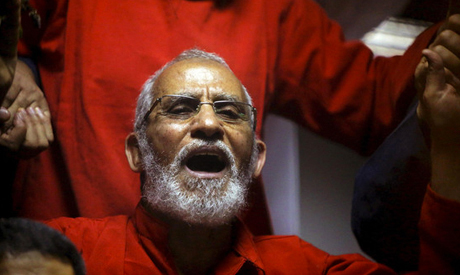Hossam al-Haddad
After seven years of litigation since 2014, the Egyptian Court of Cassation on Monday, June 15, upheld the execution sentence of 12 defendants, including leaders of the terrorist Brotherhood, to be final and enforceable rulings in the case of the Rabaa al-Adawiya sit-in in 2013. This ruling brings us back to a similar ruling in the last century in Case No. 12 of 1965 (Regulation 65), in which Sayyid Qutb, Youssef Hawash and Abdel Fattah Ismail were sentenced to death and executed on the morning of August 29, 1966. Four others were also sentenced to death, but their sentences were commuted to life in prison, including Ali al-Ashmawi, Ahmed Abdel Majid Abdel Samie, Sabri Arafa el-Koumi and Magdy Abdelaziz Metwally. The rest of the accused received sentences ranging from ten years to life in hard labor.
It is believed that the effect of modern judicial rulings in 2021 will have the same effect as the old judicial rulings, as the Brotherhood’s presence vanished from the political arena and they no longer had an impact. The terrorist group entered a state of hibernation, as some migrated and some were ashamed. The group and its elements did not return to the public political sphere until after Gamal Abdel Nasser’s death and Anwar Sadat’s permission to return after his failure to contain the leftists.
Brotherhood abroad
Several newspapers dealt with news reports about the Brotherhood’s position abroad after the ruling. These reports revealed that the Brotherhood’s leaders in Britain and Turkey are currently looking for other international mediation to interfere with President Abdel Fattah al-Sisi, who must ratify the ruling before the Public Prosecution while the prison sector must determine a date for the execution of the death sentence. Brotherhood leaders also called on other international organizations to pressure the regime to refuse to ratify the sentence and instead commute it.
According to Article 155 of the Egyptian Constitution, which was issued in 2014, in the event of a final death sentence for the accused, the head of state has the right to issue a decision to pardon the sentence completely or commute the sentence after consulting the Cabinet. In the event that a presidential pardon is not issued for the accused to cancel the sentence or commute it within a period of 14 days, the date of execution is determined by a decision of the Public Prosecution, and the Prisons Authority in the Ministry of Interior implements the death sentence.
Range of impact
There is no doubt that the Brotherhood is completely managed from the outside and that this judicial ruling has created a state of great anger that dominates the group’s leaders and members, and they attributed the Brotherhood’s successive crises, the result of which was this ruling, to the recent decisions of General Guide Ibrahim Mounir. It is expected that the coming days will witness escalatory moves against him that may actually lead to his isolation, as he caused major crises for the organization and did not succeed in resolving any of the outstanding issues, and he misbehaved to a large extent in response to the Egyptian-Turkish rapprochement.
The Brotherhood is currently experiencing a stormy internal crisis that may result in more internal divisions and cracks due to the great anger that is sweeping the youth and leaders in Egypt, after the decisions of the leaders in charge of managing the organization at the present time revealed the extent to which the group deceived its members by drawing an incorrect picture of the nature of the Turkish support, which quickly vanished after Turkish President Recep Tayyip Erdogan realized the extent of the danger the group posed to his political future and his country’s relations with its regional environment, which reflects the mismanagement of this file by the organization’s leaders.
Human rights organizations
In a new attempt by the Brotherhood and its loyalists to put pressure on the Egyptian administration, Egyptian human rights organizations demanded the immediate suspension of the death penalty and a review of the sentences issued against 12 leaders of the Brotherhood, which Egypt classifies as a terrorist organization, against the background of their trial in the Rabaa sit-in case.
In a statement, nine organizations announced their demands to open a “serious and independent” investigation into the “mass killing” of demonstrators during the dispersal of the Rabaa sit-in in August 2013 and to “hold the perpetrators accountable.”
The organizations also called for a review of what they described as mass trials that “lack guarantees of justice… and entrench a policy of impunity,” according to their statement, which was issued two days after confirming the death sentences and life imprisonment issued by the Egyptian Court of Cassation to become enforceable.








































admin in: How the Muslim Brotherhood betrayed Saudi Arabia?
Great article with insight ...
https://www.viagrapascherfr.com/achat-sildenafil-pfizer-tarif/ in: Cross-region cooperation between anti-terrorism agencies needed
Hello there, just became aware of your blog through Google, and found ...